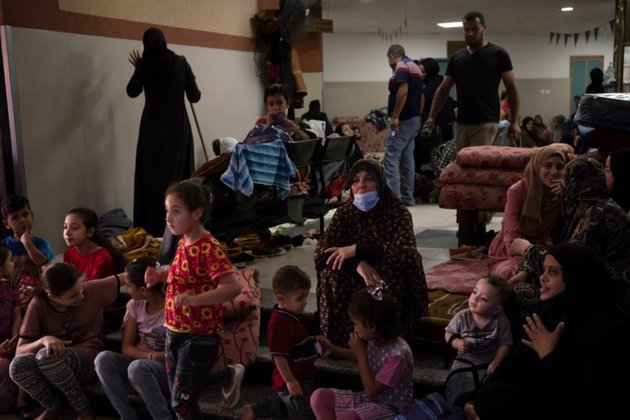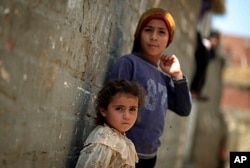

washington – Palestinians are the largest stateless community worldwide, according to the United Nations, and when they become refugees, the way to resettlement is not a straightforward journey.
Refugees are a product of conflict. While the roots of the Israel-Gaza war trace back decades, the recent fighting flared on October 7 when Hamas militants attacked Israelis, killing 1,400 and abducting more than 200 back to the Gaza Strip. The U.S. designated Hamas a terror organization in 1997.
In response, Israel initiated bombings targeting Hamas in Gaza and urged residents to flee south, displacing more than 1.4 million people. As of Thursday, nearly 629,000 internally displaced people were sheltering in 150 U.N. Relief and Works Agency (UNRWA) facilities.
In the three weeks since Hamas’ attack, only a limited supply of water, food and medical aid has entered Gaza because of an Israeli blockade on the Hamas-controlled territory.
A Palestinian youth reacts as he sits on the rubble of a destroyed home following an Israeli military strike on the Rafah refugee camp, in the south of Gaza Strip, Oct. 15, 2023, amid battles between Israel and the Palestinian Islamist group Hamas.
Why is it so complex for Palestinians to leave?
There isn’t a specific refugee resettlement program for Palestinians living in the occupied Palestinian territories, according to human rights experts.
UNRWA provides social services, education, health care, shelter and some emergency aid to Palestinian refugees in Jordan, Lebanon, Syria, the Gaza Strip and the West Bank, including east Jerusalem.
But UNRWA does not have the authority to give Palestinians refugee status under the 1951 Geneva Convention. Nor does the U.N. High Commissioner for Refugees have that authority while they are in UNRWA’s area of operations; it can designate Palestinians as refugees only when they are outside UNRWA’s jurisdiction.
“The Refugee Convention was written such that it excluded [Palestinians] from protection and consideration by the UNHCR,” Yael Schacher, director for the Americas and Europe at Refugees International, told VOA.
Yet, Schacher said, places like the United States have resettled Palestinians.
“If a Palestinian leaves one of those [UNRWA] areas for someplace else, either by force or needs to leave … there’s been some legal decisions that have said that UNRWA is so underfunded and unable to provide for Palestinians, even in those areas, that they should be under the auspices of the U.N. High Commissioner for Refugees and be able to be given refugee status and be eligible for referral for resettlement,” she said.
Are there ways for Palestinians to leave?
It is not easy for Palestinians to travel outside the occupied territories – the West Bank, east Jerusalem and the Gaza Strip – to attend visa interviews at consulates of the countries to which they hope to travel.
If they wish to travel to or through Egypt, they must receive authorization from the Egyptian government, under strict guidelines. To travel to Israel, they must receive permits.
Human rights experts said a pass to leave Gaza through Israel is extremely difficult to obtain and usually requires the applicant to have a medical condition that cannot be treated in Gaza or have a connection with a foreign entity. Even then, the rate of acceptance is not high and can be delayed for a long time.
Travel through Egypt means a grueling journey across the Sinai Peninsula. But the biggest issue is the limited number of permits per day, which means waiting many months for a permit.
Departing by boat is rare and dangerous, according to human rights organizations.
Since the October 7 attack, the Rafah border crossing between Gaza and Egypt has been closed to Palestinians, and Egyptian President Abdel-Fattah el-Sissi has reiterated his country’s stance against allowing resettlement of Palestinians from Gaza in the Sinai.
How many Palestinians have resettled in the U.S.?
The United States historically has accepted a limited number of Palestinian refugees.
VOA asked the U.S. State Department about resettling Palestinians, and a spokesperson referred to comments by Secretary Antony Blinken in an October 15 interview with Al Arabiya:
“I’ve heard directly from Palestinian Authority President [Mahmoud] Abbas and from virtually every other leader that I’ve talked to in the region that the idea [of relocating Gaza residents] is a nonstarter, and so we do not support it. We believe that people should be able to stay in Gaza, their home. But we also want to make sure that they’re out of harm’s way and that they’re getting the assistance they need.”
Between fiscal 2019 and 2023, about 140 Palestinian refugees resettled in the United States. According to State Department data, fewer than 600 Palestinians have moved to the U.S. under the Refugee Admissions Program, established by Congress in 1980.
For those able to get a referral through UNHCR to the U.S. refugee program, the vetting process is long with multiple layers of security screening, interviews and medical exams by the U.S. government. It can take more than three years for accepted refugees to arrive in the United States.
The government also uses FBI databases and other agencies to guarantee refugees do not present a national security risk.
Palestinians also can apply for visas, but an application for a nonimmigrant visa does not provide access to refugee or relocation assistance.
Albert Mokhiber, an immigration attorney in Washington, told VOA that right now Palestinians are trapped. Those who manage to come to the U.S. through a visitor’s visa, a student visa or a work visa with a U.S. company could file for asylum.
But getting a visa now is next to impossible, Mokhiber said. And asylum?
“Good luck, because asylum became more political than asylum. And what I mean by that is, if you’re an ally of the United States, and in particular Israel, it’s going to be a lot harder to convince the government that you have a well-founded fear of persecution,” he said.
 FILE – Two Palestinian refugee children lean on the wall of a house in Gezirat al-Fadel village, Sharqiya, about 150 kilometers east of Cairo, Egypt, May 17, 2013.
FILE – Two Palestinian refugee children lean on the wall of a house in Gezirat al-Fadel village, Sharqiya, about 150 kilometers east of Cairo, Egypt, May 17, 2013.
Palestinians and other countries
Palestinians have been able to leave and settle in European countries, but it has become difficult in recent years.
The Palestinian Central Bureau of Statistics reported the total Palestinian population worldwide at 14.3 million, with 6 million in other Arab countries primarily as refugees and 800,000 in other countries.
Azza Alhayyek, originally from Gaza City, has lived in Belgium since 2018. In a phone interview with VOA, she said she left Gaza through a family reunification process available to her and her children through her husband.
“He used to work in an international organization [in Gaza] and they helped him to get a visa. … He had to have a visa to Germany and then he came to Belgium and submitted an asylum-seeker application. After multiple interviews, they accepted him,” she told VOA.
Alhayyek’s husband then filed for his family to move to Belgium. She said it was a long process but eventually they were reunited. But Alhayyek’s parents and sisters remain in Gaza.
“I tried with the [Belgium] immigration office to [ask] them if I [could] get a humanitarian visa for my family to come. But it’s so complicated. I didn’t even have a response,” she said.
“It’s not functioning now and the Egyptian borders are closed. So even if we [could] get a visa, they [would] not be able to leave Gaza,” Alhayyek said.
“Physically [my relatives] are OK, but I can tell mentally they are so down. … I spent all the time waking up just to open the TV and see where is the bombing, because they don’t know. They just hear sounds and they don’t know what’s going on. … They are so scared,” she said.
When people ask her how her family is, she says, “They’re still alive. And we have to be grateful for that in this situation.”
24World Media does not take any responsibility of the information you see on this page. The content this page contains is from independent third-party content provider. If you have any concerns regarding the content, please free to write us here: contact@24worldmedia.com

A Brief Look at the History of Telematics and Vehicles

Tips for Helping Your Students Learn More Efficiently

How To Diagnose Common Diesel Engine Problems Like a Pro

4 Common Myths About Wildland Firefighting Debunked

Is It Possible To Modernize Off-Grid Living?

4 Advantages of Owning Your Own Dump Truck

5 Characteristics of Truth and Consequences in NM

How To Make Your Wedding More Accessible

Ensure Large-Format Printing Success With These Tips

4 Reasons To Consider an Artificial Lawn

The Importance of Industrial Bearings in Manufacturing

5 Tips for Getting Your First Product Out the Door